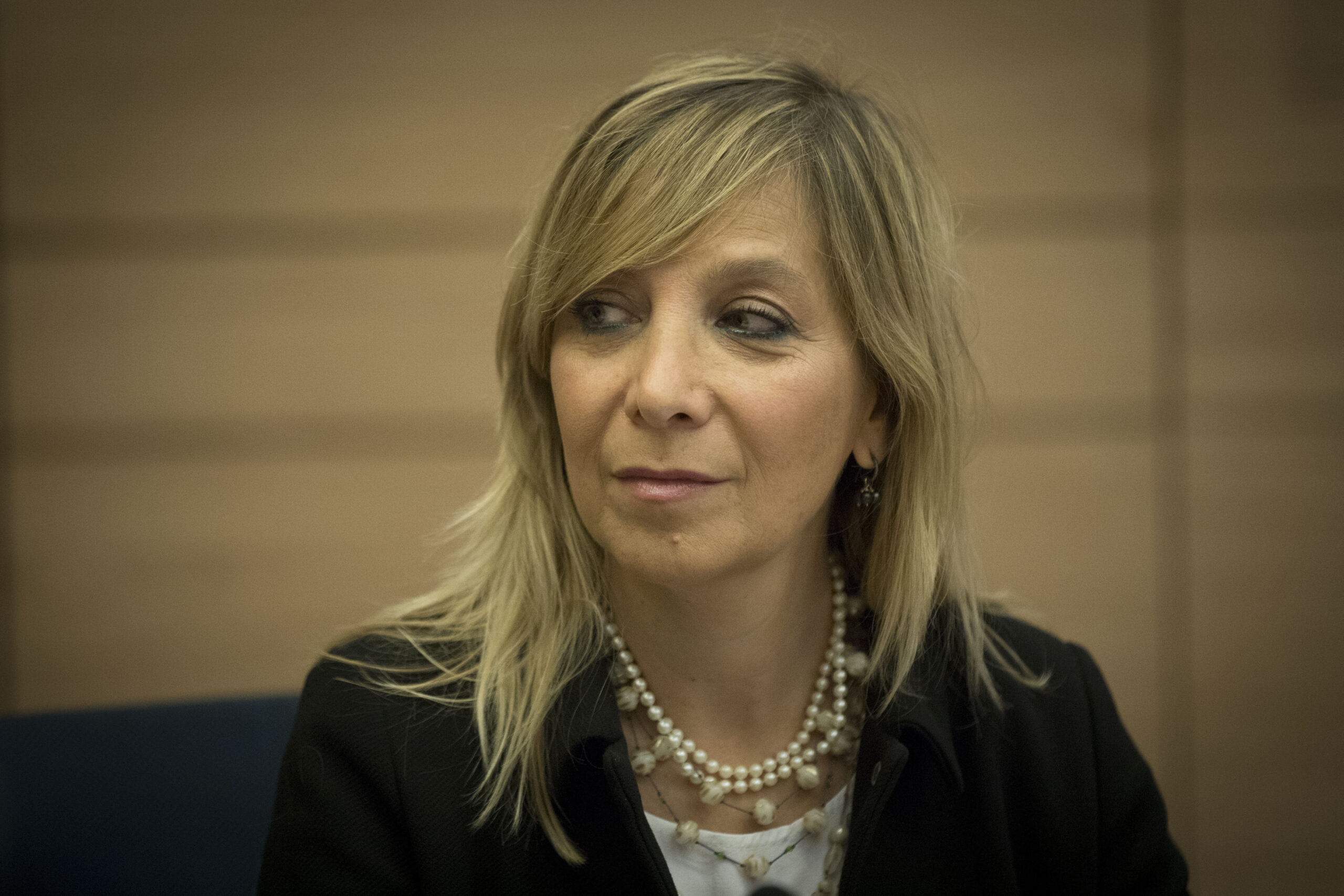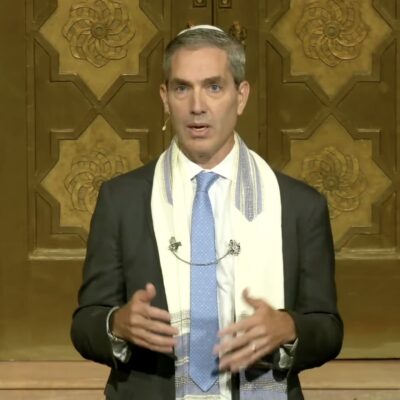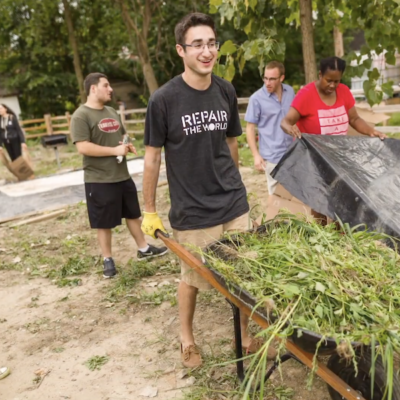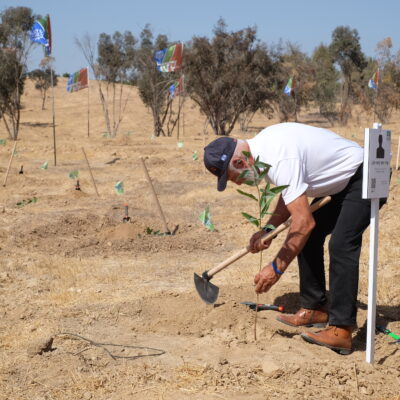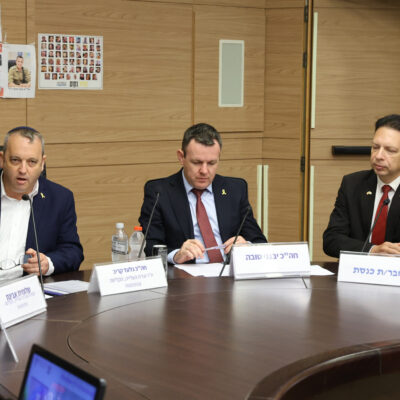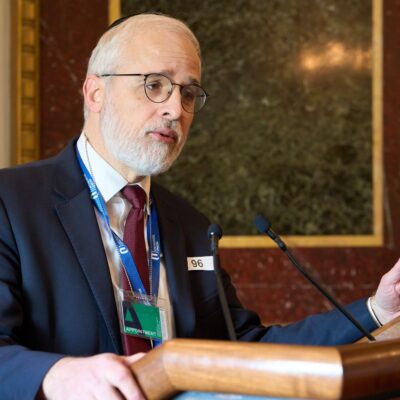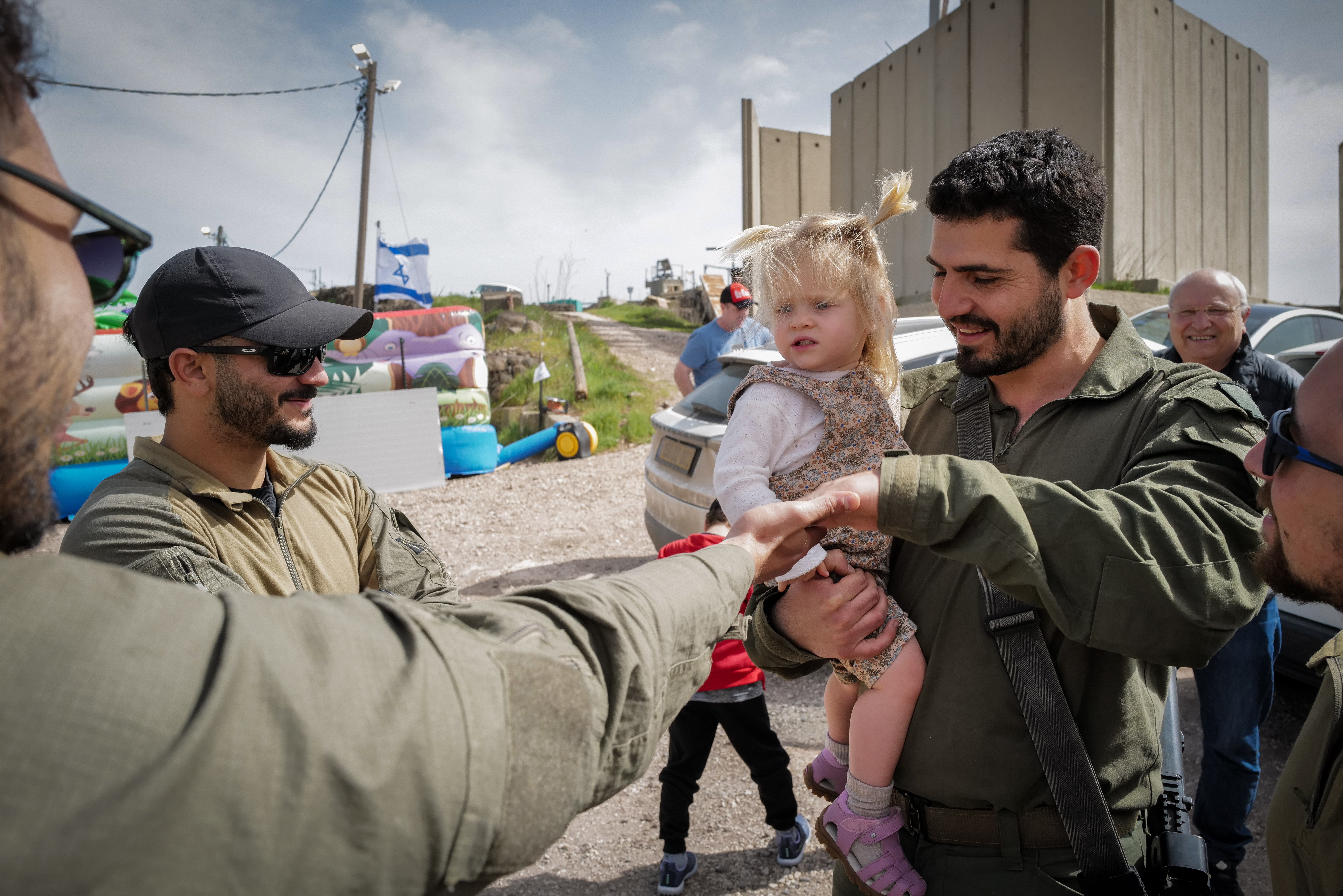Your Daily Phil: Young Jews moving to Tulsa + Why educators need security training
Good Wednesday morning!
In today’s Your Daily Phil, we cover a group trying to attract young Jews to the Sooner State, and feature op-eds by Camp Livingston’s Max Yamson supporting a four-day workweek, and by Jen Zak, of Temple Sinai in Brookline, Mass., on synagogue and school safety. Also in this newsletter: Dr. Monique Katz, Elana MacGilpin and Lenny Krayzelburg. We’ll start with news of campus vandalism to kick off the Jewish year.
Jewish students at Rutgers University had a jarring start to the new year: The house of the Jewish fraternity Alpha Epsilon Pi was reportedly vandalized by egging on Monday, the first day of Rosh Hashanah.
It was one of three antisemitic incidents on college campuses that took place as students celebrated Rosh Hashanah. A swastika was found in a residence hall at American University, while antisemitic leaflets were found at the University of Michigan in Ann Arbor.
This is the third time Rutgers AEPi has been hit with eggs on a Jewish holiday: similar acts of vandalism occurred on the past two Holocaust Remembrance Days in April of 2021 and 2022 — with the latter incident helping prompt increased security patrols on campus, according to a local ABC affiliate.
Jon Pierce, the spokesman for national AEPi, told eJewishPhilanthropy, “We are cooperating with university officials and local authorities in their investigations and will have no further comment until those investigations are complete.”
New Jersey Gov. Phil Murphy tweeted on Tuesday, “Antisemitism has no place in New Jersey. I will always condemn and speak out against bigotry and intolerance.”
Rep. Josh Gottheimer (D-NJ) also condemned the incident on Twitter, writing, “AEPi at Rutgers has once again been vandalized — this time during the high holiday of Rosh Hashanah. Let me be as clear as I can be: no student deserves to be targeted because of who they are or what they believe — here or anywhere.”
OK GO
The group working to make Tulsa a hub for young Jews

Rebekah Kantor/Tulsa Tomorrow
Heather Wilk’s grandmother was born in Tulsa in 1895, before Oklahoma became a state, and her great-grandparents were among the first Jews in the territory. Despite these hometown ties, Wilk knew that, in order to pursue a career in media and entertainment, she would have to leave for somewhere with more possibilities. But now, after returning for a tour of the city, she’s not sure that’s true for today’s young Tulsans, reports eJewishPhilanthropy’s Esther D. Kustanowitz.
Attracting young Jews: Wilk was a participant on a tour led by Tulsa Tomorrow, a Jewish organization founded in 2020 that has helped convince more than 50 people to move to the area, with a retention rate higher than 85%. According to the Jewish Federation of Tulsa, the city has approximately 2,000 Jews, including about 200 young adults.
On the map: Tulsa Tomorrow’s itineraries include sightseeing tours, as well as networking events with city leaders, developers and people whose careers relate to the participants’ professional interests. The goal is to help prospective residents imagine their career path, and “put Tulsa on the map for young Jewish adults,” Rebekah Kantor, the group’s executive director, told eJP.
THE FUTURE OF WORK
Recalibrating: An argument for the four-day workweek

Shutterstock
“‘You’re a camp director – that’s so great. What do you do the rest of the year?’ Overnight residential camps are open for over three months a year around the clock. As for the rest of the year, I spend much of my time recruiting staff and campers,” writes Max Yamson, executive director of Camp Livingston, headquartered in Cincinnati, in an opinion piece for eJewishPhilanthropy.
Above-average hours: “I get it, being a camp professional isn’t a normal 9-to-5 job, but I am very busy year-round… I did the math. Our full-time team members work more than 2,950 hours each year. My wife, who used to work for a big law firm, tells me that these are the kind of hours she was expected to bill to clients, but big law firm salaries are five times larger and the burnout and negative effects on mental health are notorious – not something to aspire to. In comparison, the average American worker works 2,080 hours annually.”
Fridays off between camping seasons: “I have been reading a lot about the four-day workweek as the future of work. The evidence is compelling – in addition to being overwhelmingly supported by workers and a huge benefit for companies trying to attract talent, there is support that the four-day workweek actually generates more productivity, creativity and engagement… Most relevant to those of us grappling with a ‘post-pandemic’ world, employees are less stressed and the mental health outcomes are better… I am concerned for the well-being of my full-time staff coming out of working 16-hour days during summer, so I pitched an idea to my board: Fridays off for the 40 weeks between camping seasons.”
FEELING SAFE IN OUR COMMUNITIES
Why Jewish educators need safety training

Shutterstock
“Does your synagogue have a safety plan? Has your community completed a threat vulnerability assessment in the last five years? When was your safety plan last updated? When was the last time you practiced it with your teachers? With your students? Do you know where your first aid kits are? Do you know if they have been restocked any time recently? Would everyone know what to do if there was an emergency?” asks Jen Zak, an attorney and director of education at Temple Sinai of Brookline, Mass., in an opinion piece for eJewishPhilanthropy.
Educators need safety and security training: “Many if not most Jewish religious educators cannot answer these questions. And many of us struggle with feeling safe in our community’s spaces. We may not have a consensus on what our safety plans should look like; it is easy to get mired in the controversial aspects of security planning. But this should not prevent us from partnering in the work of creating communities where we feel safe. As teachers and community leaders, we frequently shepherd the largest numbers of people through our buildings – including small children, who need guidance and direction. Many of us are aware that this is a time when our community is most vulnerable and most likely to need an effective safety plan. Because of our central role in our communities, Jewish religious educators need safety and security training.”
All plans are local: “The safety plan your synagogue creates can and should be tailored to the ethics and needs of your community. In some congregations, the presence of law enforcement or firearms will alienate congregants and make the community feel less safe. In other congregations, uniformed police officers and other highly visible security measures will support the community’s feeling of safety. Creating a diverse security committee is one way that you can ensure that different voices in your community are empowered. Reckoning together with the challenges of creating an open and welcoming community that is also secure and protected is a daunting task. While we may not agree on what this should look like, we can all agree that avoiding this work resolves nothing. There are no solutions in stasis.”
Worthy Reads
Expanding Grantmaking Equity: The Equitable Giving Project, designed to elevate the voices of grantseekers from underrepresented backgrounds, identified steps that philanthropic leaders should take to expand equity in their grantmaking, Michelle Molitor writes in Inside Philanthropy. “Expand opportunities beyond traditional grant applications. Offer grantseekers additional venues to demonstrate their work, such a speaker series, showcases and networking circles. Provide mentorship, coaching and feedback. Work directly with grantseekers to refine their applications and learn from the process. Create opportunities for broader relationship-building. Many unspoken networking opportunities depend on hallmarks of privilege, such as an elite college affiliation or a mutual acquaintance from a similar social class. Build out structured opportunities for networking with leaders outside of these circles. Redesign the grant application process for greater accessibility. Consider streamlining your grant application steps and requirements, updating outdated processes, and offering greater transparency and guidance throughout the process… More than anything, the pandemic proved that when there is a will to move quickly, the philanthropic sector has more than enough power to do it.” [InsidePhilanthropy]
Community Comms
Be featured: Email us to inform the eJP readership of your upcoming event, job opening, or other communication.
Word on the Street
Professional fundraisers who work for charities in the United States and Canada saw their salaries rise in 2021, with more respondents indicating they plan to stay at their current organization than in previous years, according to the Association of Fundraising Professionals’ annual “Compensation and Benefits Study”…
A new study from researchers at the Paul H. O’Neill School of Public and Environmental Affairs and the Lilly Family School of Philanthropy, “Giving and Going: US Congregational Participation in Disaster Response,” found that more than 70% of U.S. congregations participated in charitable giving in 2017 for disaster relief and more than half participated in volunteer relief efforts. Congregations located close to disaster-prone areas were more likely to participate, with congregations composed of older members more likely to give money and those with younger members more likely to volunteer…
A new report from Charleston, S.C.-based Blackbaud Institute, “Philanthropy Through Recession: How Savvy Organizations Weather Uncertain Times,” examines philanthropic activity over the past four decades. The report concludes that the philanthropic impulse is stronger than the pressures of economic downturns…
The U.K.’s Institute for Jewish Policy Research (JPR) issued a new report, “Six takeaways about Jewish life under lockdown,” based on a sample of more than 4,000 Jews in the summer of 2021, building on JPR’s previous research into the social, religious and economic impact of the pandemic on the Jewish community in 2020…
UJA-Federation-New York is committing $25,000 to the Afya Foundation to provide first aid supplies and personal hygiene kits to support those affected by Hurricane Fiona in Puerto Rico…
The Herta and Paul Amir Foundation gave $10 million to the University of Haifa to develop a new technology complex that aims to increase access to education and employment for the school’s students…
New Jersey philanthropist Dr. Monique Katz and her family, along with Israel’s Bar-Ilan University, have made a multiyear commitment to expand the Orthodox Union Heshe and Harriet Seif Jewish Learning Initiative on Campus, known as JLIC, which sends young Orthodox rabbis and their spouses to serve Jewish students on campus. A JLIC couple will also begin attending to students at Tel Aviv University…
The Indianapolis-based Lilly Endowment announced grants totaling $91.5 million in support of nine national youth-serving organizations. The grants will bolster the organizations’ efforts in Indiana. Recipients include Big Brothers Big Sisters of America, Boys & Girls Clubs of America and Girls Inc…
The Kate B. Reynolds Charitable Trust, one of the largest private funders in North Carolina, announced that it will divest its endowment from tobacco and pursue a socially responsible, community-focused investment strategy in support of grantmaking centered on racial equity, health and well-being…
Elana MacGilpin has been promoted from development and stewardship officer to senior development officer at the Jewish Community Foundation of Greater Hartford…
Pic of the Day

Jewish Day Camp Network
Sixty-five camp professionals representing 43 Jewish day camps gathered last week for the second annual Jewish Day Camp Network fall conference, held at the JCC Camps in Medford, N.J.
Birthdays

Kevork Djansezian/Getty Images
Winner of four Olympic gold medals for the U.S. in swimming in 2000 and 2004, Leonid “Lenny” Krayzelburg…
International Emmy Award-winning Scottish television producer, Sir Jeremy Israel Isaacs… Former governor of Vermont and the first Jewish woman elected to govern any state, she was also the U.S. ambassador to Switzerland, Madeleine May Kunin… Physician and theoretical biologist, he was a 1987 MacArthur Fellow, Stuart Kauffman… Former president of Warner Home Video, Warren Lieberfarb… French businessman who, with his brother, owns the controlling interest in the House of Chanel and several vineyards, Alain Wertheimer… Real estate agent in New York’s Hudson Valley, Jerry Alan Weiss… Teaneck, N.J.-based real estate attorney, Gary E. Miller… U.S. senator, Bill Cassidy (R-LA)… Pediatrician and author of the book Winning A Debate with An Israel Hater about the fight against BDS, Dr. Michael Harris… Bestselling author and magazine journalist, Ben Greenman… Area director for San Diego and Orange counties for AIPAC, Elliott Nahmias… News editor and correspondent at Voice of America, Michael Lipin… SVP at the Katz Watson Group, Lauren France… Marketing manager at the Anti-Defamation League, Samantha Collidge… Teacher in the Miami-Dade County public schools and a field organizer for the OU’s Teach Coalition, Hadassa Levenson… Chief of staff at Tel Aviv-based iAngels, Ayelet Cohen… Student at Yale Law School and author, David Hopen… Former NFL, XFL and CFL wide receiver and kick returner, Daniel Braverman… Director of partnerships and marketing at Reboot, Josh Kanter…
Email Editor@eJewishPhilanthropy.com to have your birthday included.


 Add EJP on Google
Add EJP on Google